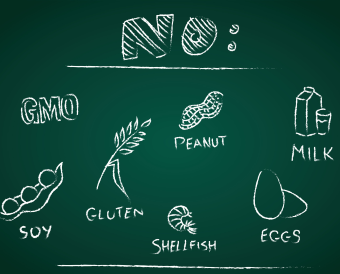The Natural & Organics Show (NOPEX) will be taking centre stage once more at…

Dietary Restrictions and the Food Industry
Dietary restrictions are common in our society. Many people choose to avoid or consume certain foods as a personal preference. Others choose this path because they have no choice e.g. they have a food allergy. The food industry is rising to the challenge of responding to these dietary restrictions and the results are both positive and negative:
What is a Vegan Diet and a Vegetarian Diet?
It is estimated that 40% of the Indian population are vegetarian, the highest figure for any country. In 2016 vegetarians in Australia made up 11.2% of the population. Meanwhile certain countries in southern Europe, like Portugal, only had 1.8% (2014), the equivalent to 200,000 citizens.
Vegetarian diets tend to mean the consumption of mostly plants with the addition of dairy products and eggs. Meat and fish are not part of this diet. People distinguish between several types of vegetarian diets: ovo (eat eggs but not dairy), lacto (eat dairy but not eggs) and lacto-ovo (eat both eggs and dairy). A vegan diet consists of abstaining from the consumption of animals and any animal derived products, such as dairy and eggs, for example.
With so many people around the world with these dietary requirements, the food industry is responding to them by providing more options that cater to these preferences. In order to communicate to these consumers, manufacturers have available various labels including certifications. Certifications are employed as a shorthand so that consumers, which are often in a hurry, do not have to review the complete list of ingredients. Some supermarkets and food manufacturers employ a generic V for vegetarian or K for kosher. However, these marks are not as reliable as a certification issued by a third party agency which has audited the manufacturer of the product. The UK Food Standards Agency (FSA) in 2006 published guidelines that aimed to improve food labelling for vegans and vegetarians.
The FSA guidelines that allow UK vegetarians to make complaints against food manufacturers to Trading Standards were adopted in principle by the European Parliament. This means that if the term ‘vegetarian’ or vegan’ is misused; people have a legal claim against the manufacturer.
Dietary Allergies
In the USA, packaged food must list all ingredients that go into that specific package. This is a requirement by the Food Allergen Labelling and Consumer Protection Act (FALCPA) for dietary allergy purposes. The FDA also states that ingredients in food should always be listed by their common name or should contain an allergen announcement (for example, CONTAINS NUTS). If more than one product is manufactured and packaged in the same factory, the labels should also say ‘May Contain’ to refer to the possibility of cross-contamination.
Dietary Restrictions with Sugar
With obesity levels on the rise, Public Health England (PHE) is attempting to reduce the sugar content of food and drinks with tighter marketing regulations, which includes the infamous proposed ‘sugar tax’. However, food industries have rejected this proposal of tax on sugar, which would see the price of sugary products rise by 10-20%, but reducing sugar consumption in the general population.
Despite this, the food and drinks industry have accepted the ban on advertising high fat, salt or sugar products in children’s media, which is a victory in the fight against junk food and obesity.
Dietary restrictions have been proven to have positive effects on health, so it is not surprising that the number of consumers practising these restrictions is rising. Consumers are also seeking fairtrade foods more than ever, as they see it as more sustainable. KLBD Kosher offers kosher accreditation in quick and easy steps, so contact the team today to learn more about this type of diet or how to become accredited.





